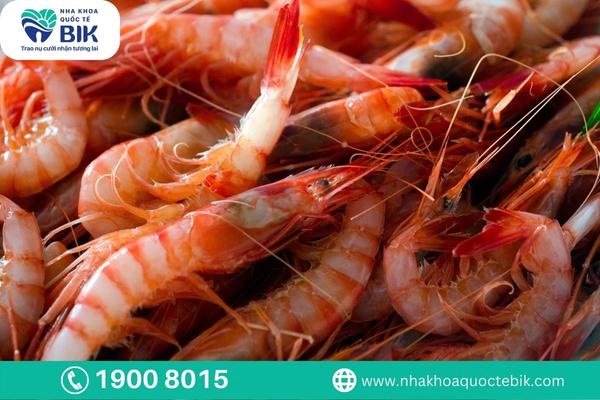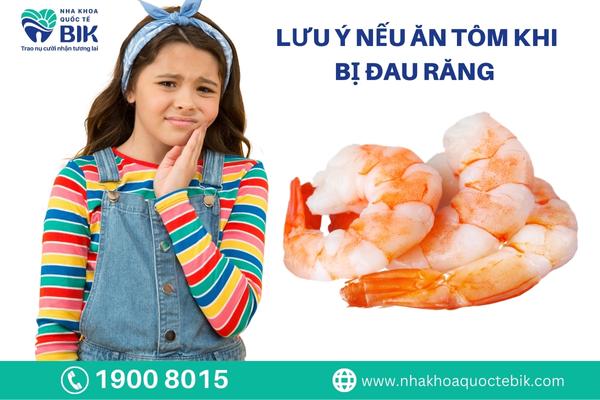
To know whether you can eat shrimp when you have a toothache, you need to find out if shrimp contains any ingredients that irritate and affect your teeth. In fact, shrimp contains a lot of calcium and other substances necessary for the body without damaging your teeth if prepared properly. Therefore, people with toothache can add dishes such as shrimp porridge and shrimp soup to their diet to make their meals more diverse.
1. Can you eat shrimp when you have a toothache?
When you have a toothache, you need to supplement minerals such as calcium, iron, magnesium, etc. to protect your teeth from further decay and to help strengthen the tooth’s protective layer against external influences. Foods rich in calcium include: fish, eggs, milk, etc. and especially shrimp.
So when you have a toothache, you can still add shrimp to your diet to supplement the necessary nutrients. However, to avoid teeth damage and difficulty chewing, shrimp can be processed into easy-to-eat dishes such as porridge, soup, broth, etc. In addition to supplementing calcium-rich foods such as shrimp, you should also supplement other substances such as fiber and vitamins found in vegetables and fruits.
2. Dishes made from shrimp that don’t cause toothache
Although shrimp does not contain any ingredients that affect toothache, to relieve the pain, shrimp should still be prepared in the following ways:
2.1. Steamed tofu with shrimp
Soft tofu is definitely a very suitable ingredient for those who are suffering from toothache because it does not require too much chewing force. Steamed tofu and shrimp combined with a special sauce will make the menu for people with toothache much more diverse.
2.2. Shrimp and vegetable soup
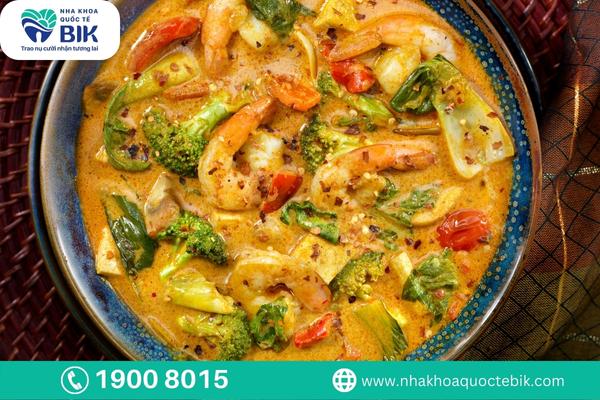
Shrimp and vegetable soup is a great suggestion for the menu for people with toothache. The stewed vegetables will become soft and easy to eat, combined with fresh peeled shrimp will surely win everyone’s heart, even the most difficult people. All the ingredients in the soup cooking process have softened, so people with toothaches can feel secure when eating this dish.
2.3. Shrimp porridge
To avoid affecting the aching teeth, you can chop the shrimp very finely and then cook it into porridge. In addition, you can combine it with quinoa to fully supplement the body’s nutrients. This is a special grain that helps prevent cardiovascular diseases, improve the body’s organ function and strengthen the immune system.
3. Note if you eat shrimp when you have a toothache
Shrimp shells are usually quite hard, so they can easily get stuck in the teeth when eaten. If not cleaned for a long time, plaque will form, causing toothache and other oral problems. Therefore, people with toothaches should pay attention to peeling the shrimp before eating to avoid prolonged pain.
Those with allergies should be careful because shrimp contains a fairly high protein content.
Brush your teeth thoroughly after eating shrimp to avoid leftover food affecting the gums, gums and tooth roots that are already painful.
4. Can I eat beef with toothache?
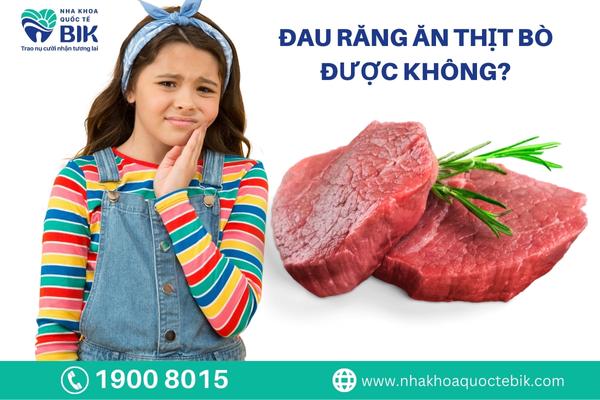
For a long time, beef has been loved by many people because it contains abundant nutrients and brings many benefits to human health. Not only that, many studies show that the substances in beef are also good for oral health, improving and providing nutrients to nourish strong teeth.
In addition, many opinions say that this type of meat is quite tough and hard, if eaten regularly, it can make toothache worse. But in fact, beef is also fibrous like many other types of meat, if processed incorrectly, any dish can bring the risk of toothache.
Can people with toothache eat beef? The answer is that it is absolutely possible to add beef to the daily menu, but you should learn how to process it so that the meat is soft and not tough. In addition, you can combine beef with other foods to supplement balanced nutrition to help the body stay healthy, improve resistance and immunity.
5. Can you eat chicken with a toothache?
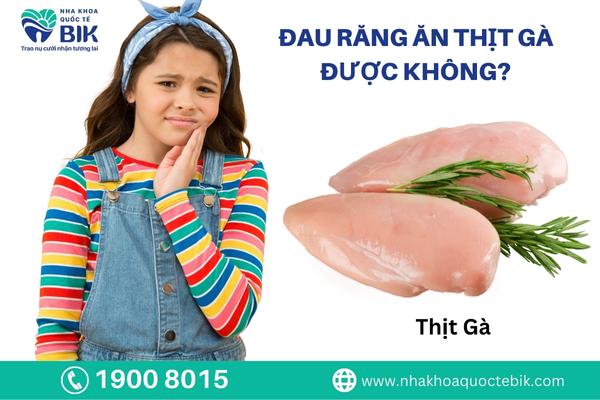
Folklore used to advise people with toothaches not to eat chicken, but this concept is no longer true.
Chicken has a sticky, fibrous texture, so it easily sticks to the teeth, thereby creating conditions for bacteria to arise and attack the teeth or gums, making the pain worse. Therefore, the main cause of toothache after eating chicken is due to improper oral care, allowing bacteria to enter.
So people with toothache can eat chicken to supplement enough nutrients, but need to ensure that oral care steps after eating are performed thoroughly and completely. In case chicken gets stuck between teeth, you can use dental floss to remove it cleanly. In addition, chicken should be processed to be softer with moderate size to avoid affecting the painful tooth when chewing.
6. What foods should you avoid when you have a toothache?
People with toothaches should avoid the following foods:
6.1. Hot and spicy foods
Spicy foods will greatly affect the aching tooth, they will irritate the gums, causing the sensitive gums to become painful.
6.2. Carbonated drinks
Regular carbonated drinks contain both sugar and acid, the two ingredients that most affect the nerves in the teeth. Therefore, people with toothaches should limit drinking this type of water to stop the pain from lasting.
6.3. Candy
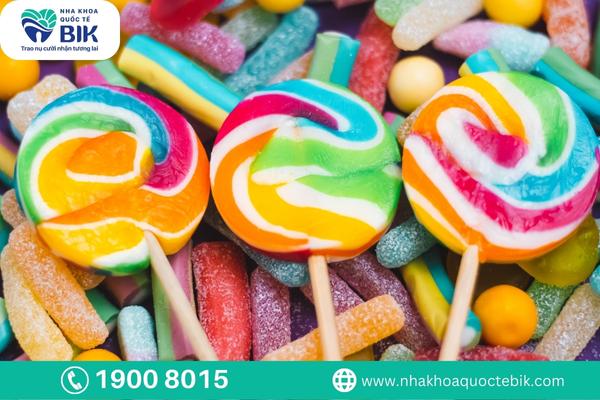
When you have a toothache or sensitive teeth, stay away from hard candies like lollipops and sucking candies. They not only contain sugar, which makes toothache worse, but can also chip teeth when requiring strong chewing force.
Chewy candies like taffy and chip chips should be limited because they are easily stuck between teeth. The amount of sugar contained in candy will stimulate the nerves in the teeth and affect the enamel.
6.4. Tomatoes
Although tomatoes contain a large amount of vitamins that are beneficial to the body, they contain quite a lot of acid that affects teeth that are painful or sensitive. Whether cooked or raw tomatoes have the same effect.
6.5. Sour fruits
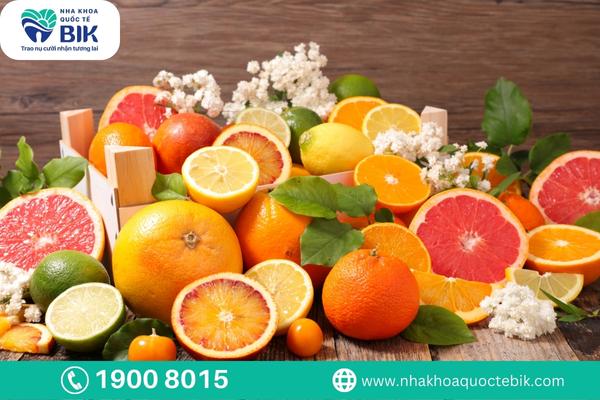
Pineapple, grapefruit or lemon are all sour fruits and have high acid content. Acid is a substance that erodes tooth enamel, making wounds more painful, difficult to heal and prone to ulcers, so you should stay away from these fruits when you have a toothache.
6.6. Ice cream
Not only hot foods, but ice cream at low temperatures will also make teeth more sensitive and vulnerable.
With the information provided above, BIK International Dental Clinic hopes that you have the answer to the question of whether you can eat shrimp with toothache. People with toothache can add shrimp to their menu to get enough nutrients, but they should also limit some foods to avoid making the toothache worse.

